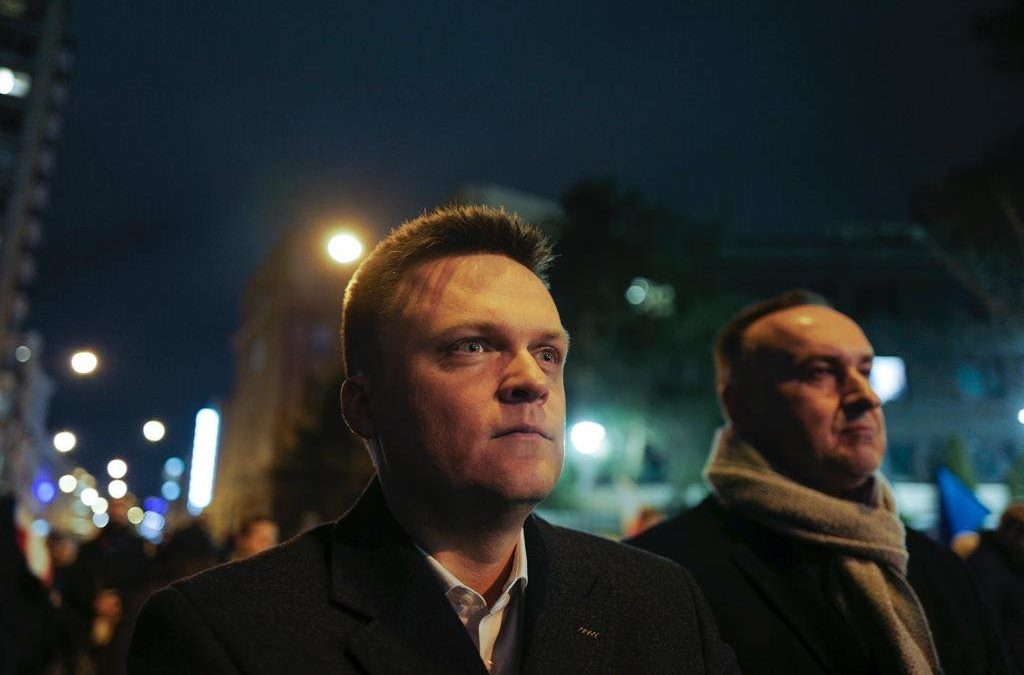A priest at a Warsaw church denied Szymon Hołownia, a TV presenter and journalist standing in this year’s presidential elections the right to communion, the most important Catholic sacrament.
Hołownia described how, after he had queued up with other congregants for communion, the priest “turned his back” on him, and instead gave the holy sacrament to others. Hołownia quotes the priest explaining that his “conscience does not allow him to do so. Because of the views you are preaching”.
The presidential candidate later revealed that he had received a phone call from the spokesperson of Warsaw’s, who apologised to him, said that the priest had “broken church rules”, and promised that “the issue will be resolved”.
A statement was then issued by the parish, expressing “regret for the situation”, which “should not have taken place”. The priest responsible had been reprimanded and reminded of the principles of giving communion, said the church.
Szymon Hołownia is a devout Catholic who once wanted to be a monk, attempting twice to enter the Dominican order. Instead, he went on to become an award-winning journalist, who started his career at Gazeta Wyborcza, Poland’s leading liberal daily, and is now a contributing writer at Tygodnik Powszechny, a Catholic weekly magazine that is the voice of the moderate wing of the Polish Catholic church.
Hołownia is best known to the majority of Poles as the anchor of “Mam Talent!” (I’ve Got Talent), Poland’s longest running TV talent show.
Journalist and TV presenter Szymon Hołownia has declared he will run for president next year, saying the system is broken and needs a non-party figure to fix it.
"I want a state where people are more important than ideology." https://t.co/jP2ow8yB0v
— Notes from Poland 🇵🇱 (@notesfrompoland) December 8, 2019
In December 2019 Hołownia announced that he will be standing in this year’s presidential elections as an independent candidate, saying that the time has come “for a man who – coming from the bottom – can repair what was destroyed from above. I want a president who will (…) unite divided people”.
He has been highly critical of the main political parties, saying that Poland can only be fixed by “somebody from the outside”.
Hołownia says that he will create his precise electoral agenda only after a series of meetings with Poles across the country. However, he has declared his support for “a friendly separation of church and state”.
In an interview for Gazeta Wyborcza, he expressed support for the current abortion law, which has been criticised by the Catholic church and right-wing activists.
A recent poll showed Hołownia with support of around 10%, putting him third, behind incumbent Andrzej Duda (45%), the candidate of the ruling Law and Justice (PiS) party, and the main opposition challenger Małgorzata Kidawa-Błońska (23%).
After Hołownia came Robert Biedroń (9%) from the Left, Władysław Kosiniak Kamysz of the agrarian Polish People’s Party (8%), and Krzysztof Bosak of the far-right Confederation (5%).
In the end, the priest did allow Hołownia to receive communion, after the presidential candidate challenged him by pointing out that he does not know anything about his motivations and conscience. Hołownia wrote that this experience was important to him, because it allowed him “to understand those that are excluded from the Church”.
“I am sure that the priest had good intentions. He probably wanted to protect the Church, Jesus, and values that are close to him (…). The question is, whether he should do it without even a conversation with the person that he is publicly excluding from the community”, wrote Hołownia.
In October, a Catholic priest in the United States denied former vice president Joe Biden communion due to the politician’s views on abortion.
Main image credit: Chris Niedenthal

Monika Prończuk is the deputy editor of Notes from Poland. She was previously the Nico Colchester fellow at the Financial Times, acting FT Poland correspondent, and journalist at OKO.press, an independent fact-checking media outlet. Her articles have appeared in Quartz, Financial Times, Politico, Gazeta Wyborcza and Tygodnik Powszechny.




















